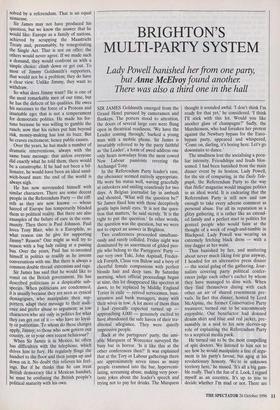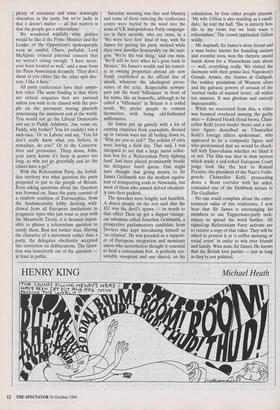BRIGHTON'S MULTI-PARTY SYSTEM
Lady Powell banished her from one party, but Anne McElvoy found another. There was also a third one in the hall SIR JAMES Goldsmith emerged from the Grand Hotel pursued by cameramen and flunkeys. The porters stood to attention, the doors of several large cars were flung open in theatrical readiness. 'We have the Leader coming through,' barked a young man with a mobile phone. Sir James is invariably referred to by the party faithful as 'the Leader', a form of awed address one only hears nowadays from the most cowed New Labour passivists revering the Archangel Tony.
In the Referendum Party leader's case, the obeisance seemed entirely appropriate. He wore his status well, waving gracefully at onlookers and smiling ceaselessly for two days. A Belgian journalist lay in ambush and shouted, 'What will the question be?' Sir James fixed him with those deceptively gentle lapis lazuli eyes. 'It is not the ques- tion that matters,' he said sternly. 'It is the right to put the question.' In other words, the question was the question, but we were not to expect an answer in Brighton. Two conferences proceeded simultane- ously and rarely collided. Friday night was dominated by an assortment of gilded peo- ple who belong to the Partygoers' Party our very own Taki, John Aspinall, Freder- ick Forsyth, Claus von Billow and a bevy of cheerful female companions with perfect blonde hair and deep tans. By Saturday morning, when official proceedings began at nine, this lot disappeared like spectres at dawn, to be replaced by Middle England Tories in exile — retired servicemen, busi- nessmen and bank managers, many with their wives in tow. A lot more of them than I had cynically expected turned up approaching 4,000 — genuinely excited to have abandoned the safe haven of their tra- ditional allegiance. They were quietly impressive people.
Back at the partygoers' party, the ami- able Marquess of Worcester surveyed the busy bar in horror. 'Is it like this at the other conferences then?' It was explained that at the Tory or Labour gatherings there are approximately seven times as many people crammed into the bar, hyperventi- lating, screaming abuse, making very poor- taste jokes about the leader's speech and trying not to pay for drinks. The Marquess thought it sounded awful. 'I don't think I'm ready for that yet,' he considered. 'I think I'll stick with this lot. Would you like another glass of champagne?' Sadly, the Marchioness, who had forsaken her protest against the Newbury bypass for the Euro- bypass party, appeared and whispered, `Come on, darling, it's boring here. Let's go downstairs to dance.'
The smallness lent the socialising a pecu- liar intensity. Friendships and feuds blos- somed. I had been banished from the main dinner event by its hostess, Lady Powell, for the sin of comparing, in the Daily Tele- graph, the Referendum Party to the way that Hello! magazine would imagine politics in an ideal world. It is endearing that the Referendum Party is still new and raw enough to take every adverse comment as personal abuse. For all its reputation as a glitzy gathering, it is rather like an extend- ed family and a perfect start in politics for genteel people who would faint at the thought of a week of rough-and-tumble in Blackpool. Lady Powell was wearing an extremely fetching black dress — with a tiny dagger at her waist.
Thus banished by her, and muttering about never much liking foie gras anyway, I headed for an alternative press dinner — the social gulag of the gathering. Jour- nalists covering party political confer- ences judge each other's cachet by whom they have managed to dine with. When they find themselves dining with each other an air of shared resentment pre- vails. In fact this dinner, hosted by Lord McAlpine, the former Conservative Party treasurer, turned out to be uncommonly enjoyable. Our benefactor had donned denim shirt and blue and red jacket, pre- sumably in a nod to his new sleeves-up role of explaining the Referendum Party to a sceptical media pack.
He turned out to be the most compelling of spin doctors. We listened to him not to see how he would manipulate a line of argu- ment in his party's favour, but agog at his revolutionary honesty. 'We're in unknown territory here,' he mused. 'It's all a big gam- ble really. That's the fun of it. Look, I regard myself as an eccentric. It's up to you to decide whether I'm mad or not. There are plenty of eccentrics and some downright obsessives in the party, but we're lucky in that it doesn't matter — all that matters is that the people get a referendum.'
We wondered wistfully what politics would be like if the Prime Minister and the Leader of the Opposition's spokespeople were so candid. Chaos, probably. Lord McAlpine evinced paternal concern that we weren't eating enough. 'I have never, ever been treated so well,' said a man from the Press Association dreamily. 'They don't shout at you either like the other spin doc- tors. I like it here.'
All party conferences have their unspo- ken rules. The most binding is that there are critical enquiries best not pursued unless you wish to be classed with the peo- ple on the pavement waving placards announcing the imminent end of the world. You would not go the Liberal Democrats and say to Paddy Ashdown, `Aw, come on, Paddy, why bother? You lot couldn't win a sack-race.' Or to Labour and say, 'You lot don't really know what you believe in nowadays, do you?' Or to the Conserva- tives and pronounce, 'Deep down, John, your party knows it's been in power too long, so why not go gracefully and let the others have a go?'
With the Referendum Party, the forbid- den territory was what question the party proposed to put to the people of Britain. Even asking questions about the Question was frowned on. Since the party consists of a rainbow coalition of Eurosceptics, from the fundamentalist lobby desiring with- drawal from all European institutions to pragmatic types who just want to stop with the Maastricht Treaty, it is deemed impos- sible to phrase a referendum question to satisfy them. Best not bother then. Having the character of a movement rather than a party, the delegates obediently accepted this restriction on deliberations. The Ques- tion was henceforth out of the question at least in public. Saturday morning was fine and blustery and some of those entering the conference centre were hurled by the wind into the arms of UK Independence Party campaign- ers in their anoraks, who are cross, in a `We were here first' kind of way, with Sir James for getting his party noticed while their own dawdles honourably on the mar- gins. 'We're the real thing,' said one man. `We'll still be here when he's gone back to Mexico.' Sir James's wealth and his temeri- ty in owning properties abroad are now firmly established as the official line of attack, whatever the ideological prove- nance of the critic. Respectable newspa- pers put the word 'billionaire' in front of his name, like an honorific, although to be called a 'billionaire' in Britain is a coded insult. We prefer people to content themselves with being old-fashioned millionaires.
Sir James put up gamely with a lot of carping enquiries from journalists, dressed up in various ways but all boiling down to, `Why are you so rich?' The politics of envy were having a field day. That said, I was intrigued to see that a large metal collec- tion box for a 'Referendum Party fighting fund' had been placed prominently beside the delegates' lunch queue. One might have thought that giving money to Sir James Goldsmith was the modern equiva- lent of transporting coals to Newcastle, but most of those who passed delved obedient- ly into their pockets.
The speeches were lengthy and heartfelt. A dozen people on the trot said that the EU was the devil's spawn — or words to that effect Then up got a dapper vintage- car salesman called Jonathan Goldsmith, a prospective parliamentary candidate from Devizes who kept introducing himself as `no relation'. He was paraded as a support- er of European integration and monetary union who nevertheless thought it essential to hold a referendum first. A perfectly rea- sonable viewpoint and one shared, on his calculation, by four other people present. `My wife Gillian is also standing as a candi- date,' he told the hall. 'She is entirely hos- tile to my views but we both want a referendum.' The crowd applauded Gillian wildly.
Mr Aspinall, Sir James's close friend and a man better known for founding casinos and eventful zoos, won the rhetoric award hands down for a Nietzschean rant about — well, everything really. We visited the daemons with their genius loci, Napoleon's Grande Armee, the Anzacs at Gallipoli, the sodden pessimism of Western elites and the galvanic powers of arousal of the `serried ranks of massed levies', all within ten minutes. It was glorious and entirely impenetrable.
While we recovered from this, a video was beamed overhead naming the guilty men — Edward Heath (loud boos), Chan- cellor Kohl (even louder boos) and a sin- ister figure described as 'Chancellor Kohl's foreign affairs spokesman', who appeared to be a composite figure and who pronounced that we would be shack- led with Euro-chains whether we liked it or not. The film was shot in slow motion which made a red-robed European Court judge look like the heir to Roland Freisler, the president of the Nazi's Volks- gericht. Chancellor Kohl, proceeding down a Bonn corridor with his aides, reminded one of the flashback scenes in The Godfather.
No one could complain about the enter- tainment value of this conference. I now hear that Sir James is encouraging his members to use Tupperware-party tech- niques to spread the word further. All signed-up Referendum Party activists are to receive a copy of that video. They will be asked to present it at 'a coffee morning or social event' in order to win over friends and family. Wise man, Sir James. He knows that the British love parties — just as long as they're not political.



















































































 Previous page
Previous page